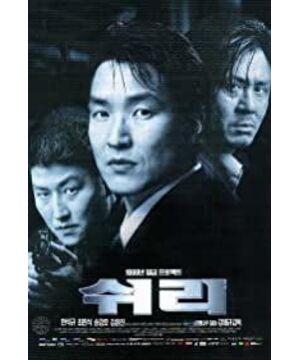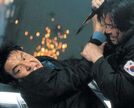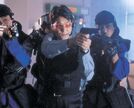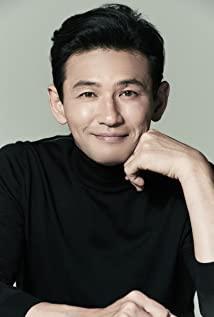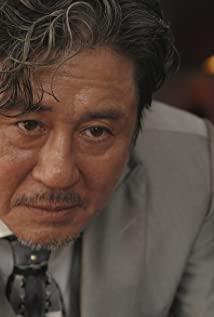After watching 1000+ movies, my wife really thinks:
Koreans are the most daring to shoot, they are too daring.
Or, there's nothing they "can't" shoot.
For example, we have strict control over topics involving modern history and politics.
But for others, it is the creator's "paradise", and excellent works are frequently published.
For example, "The Day the Country Goes Bankrupt" starring Yoo Ah-in 3 years ago.
Just by hearing the name, you can tell that the thief is energetic!
The film is aimed at the Asian financial crisis in 1997, and tells the story of the competing interests of all parties in the crisis within a week before the country's bankruptcy.
What Madam wants to say today is an old film from 22 years ago:
It is considered to be the leader in "driving the century-old Korean film industry to a new milestone"!
The movie tickets were sold out within 4 hours on the day it was released in South Korea!
A total of 6.6 million viewers entered the theater, crushing the "Titanic" that swept the world.
It made a record $35 million at the box office.
The film is called "The Butterfly Change of Life and Death", which is a milestone in the rise of Korean cinema.
Set against the background of the division between North and South Korea, it tells the tragic past between a female spy and a male agent.
The film superimposes various elements of action, love, suspense, thriller and crime.
In a word, not only dare to shoot, but also beautiful!
one
This film is directed by Kang Digyu, this is his second work.
Let's first introduce the next 4 leading actors.
The heroine, Kim Myung-hee (played by Kim Yoon-jin), is an agent of the Eighth Special Forces of North Korea.
Born in 1971, is an ace sniper.
Its main task was to assassinate key officials of the South Korean government, and was therefore followed by the South Korean authorities for a long time.
Bu Wankun (Cui Minzhi) is his instructor and his direct boss during the action.
The male protagonist, Choi Sang-hwan (played by Han Shi-gyu), is a senior agent of South Korea's national first-class secret intelligence agency.
He has a partner named Lee Jung-hee (Song Kang-ho).
At the beginning of the film, the fast-cut sharp shots show Kim Myung-hee's glorious record from training to expedition, shaping her "killer maniac" characteristics.
Since sneaking into South Korea in 1993, he has eliminated many dignitaries.
This attracted the attention of the authorities, but while Choi Sang-hwan and his partner were investigating, she disappeared.
In the second year after the Asian financial crisis, it bubbled up again.
She asked Lin Guangchao, a black market arms dealer, to help find a new weapon called the Liquid Bomb CTX.
Lin took the bribe of Kim Jong-un, a researcher at the South Korean Ministry of Defense, to let him steal.
I don't want to, it didn't work.
In order to prevent future troubles and erase traces, Kim Myung Hee killed two people.
This is So easy for her! Straightforward to solve the problem.
But the Korean side represented by the male protagonist is in trouble.
What's very strange is that every time they act, the other party is always one step ahead.
This led to the failure of the plan.
After several battles, the two gradually reached a consensus: there must be an inner ghost to inform.
But apart from them, at most, the boss, Minister Gao, knows each other's whereabouts. If there is an inner ghost, who would it be?
At the scene where the black market arms boss Lim Kwang-chao was killed, Choi Sang-hwan judged from two bullets that it must be the work of Kim Myung-hee, who disappeared a year ago.
The Korean side is still investigating and tracking along this line of thought, but they just don't know where Kim Myung Hee is?
On the other hand, in order to get CTX as soon as possible, North Korea dispatched an agent organization led by Bu Wankun.
Since outsmarting (stealing) can't be done, let's fight!
Sure enough, the Korean side was successfully intercepted by this group of people on the way to transport CTX.
After that, they were full of confidence and planned how to sabotage the upcoming friendly football match between the two countries and realize the "reunification of the motherland" in one fell swoop.
This time, Choi Sang-hwan and the others took another beat.
Li Zhengxi keenly sensed that perhaps the most dangerous person was around him.
So he installed a bug in Choi Sang-hwan's car.
Choi Sang-hwan has been hiding his identity as a secret agent from his girlfriend, and secretly observed her.
He also lied to Director Gao and his partner and tried to go it alone to get certain information.
As the plot progresses gradually, the truth is finally revealed!
It turned out that after undergoing plastic surgery in Japan, Kim Myung Hee returned to South Korea using the passport and identity of Lin Meiyu, whom she met in the hospital.
The most important thing is that she successfully lurked next to Choi Sang-hwan and became his lover.
The Korean agents have repeatedly failed, and it is all because of her mischief.
At this time, the friendly football match was held as scheduled, and the top leaders of the two countries attended.
North Korean agents attempted to assassinate the South Korean president, while South Korean agents tried their best to prevent the explosion of the liquid bomb CTX.
In the final battle, Kim Myung Hee, who had a great record, decided to die for love.
North Korea's top spy, Bu Wankun, and South Korea's Li Zhengxi were both killed by gunshots.
The "lone hero" Choi Sang-hwan successfully prevented the explosion, and the whole film ended.
two
The look and feel of "Butterfly Change of Life and Death" will make people feel delusional:
At first I thought it was an action spy film, but later I found out that it was a suspenseful romance film, but I saw it was a John Woo-style shootout film, or Liu Weiqiang's "Infernal Affairs".
The dazzling, tense and exciting sense of vision that is constantly intertwined with various types.
The action scenes of the film may be "disapproved" by watching them now, but they were full of novelty at the time.
The bloody and shaking picture shows the fierceness of the battle between the dragon and the tiger.
First, the emotions are stacked and the suspense is buried, and finally it is reversed, and the rhythm is smooth.
The first half of the love scene is romantic and beautiful, and the daily flirting and flirting can't hide the deep affection.
The most eye-catching scene is their unrequited kiss in front of the aquarium in the torrential rain.
Can not help but remind people of Andy Lau and Maggie Cheung in "Carmen Mong Kok" in the phone booth scene.
However, when each of them obeyed the arrangement of their superiors and had to fulfill their corresponding responsibilities, the contradictions that could not be hidden gradually spewed out.
The tone of the film changes from warm and sweet to heavy and sad.
In the final battle, the two raised their guns against each other.
The atmosphere at that time was murderous and could not bear to shoot.
In the face of national justice, the male protagonist still shot.
The bullet went through his temple, and he killed his lover with his own hands.
But the trembling hands were clearly a symptom of the pain of blood dripping from the heart.
The heroine immediately fell to the ground, and her eyes were full of affection, helplessness, and reluctance, as well as the happiness of liberation, which was complex and real.
The audience also immediately understood that every time the heroine performs a mission, her boyfriend is always within her sniper range, but why she never kills her.
As far as the heroine is concerned, love comes first in her bones, and politics is just a "temporary" last resort.
Therefore, after being exposed, she couldn't face her boyfriend and had to die.
The conflict between her political and love beliefs determined that she could only die.
There is an irreconcilable contradiction between personal love and national loyalty, which catalyzes a kind of pain that is worse than death, and Jin Yunzhen is very precise.
And although the male protagonist loves her wholeheartedly, he is very heartbroken after learning the true identity of his girlfriend, but his reason finally overcomes his feelings, and he has to kill her with his own hands.
At the end, he went to Jeju Island to find the real Lin Meiyu, trying to learn more about the life of his dead lover.
He also brought his lover's favorite kissing fish from his life, saying:
If one of the two kissing fish dies, the other will go on a lonely hunger strike and die.
With the lover's favorite music in the headphones, the male protagonist's eyes are full of good memories.
The film puts love in the context of the conflict of national interests, infiltrating the painful and tearing family and national conditions of the Korean nation in the split.
Even if the two fall in love with each other and yearn for a love that lives and dies together like kissing fish, they still cannot get rid of the huge barrier of "political opposition".
This kind of contradiction between emotion and reason, the inner competition is full of tension, which makes the tragic fate of people who love each other not being able to be together even more sad.
three
It is worth pointing out that fish is a very important image in the film.
The appearance of the fish is a metaphor for the love between the male and female protagonists, and witnesses the process of the two from falling in love to life and death.
At the beginning, the fish was the red line for their love affair. At the end, all the fish tanks were shot down by bullets, suggesting that their love was coming to an end.
Fish also has practical functions, and is the catalyst for the butterfly change in the relationship between the two.
In the name of decorating her boyfriend's office, the hostess placed many fish tanks and placed bugs in the belly of the fish, and her home was no exception.
As a result, she firmly controls the whereabouts of the male protagonist and his team of agents in her own hands.
Fans of Korean films may notice that director Kim Ki-duk, who passed away recently, also likes to use fish as a symbol of desire.
In a nutshell, this film is a life-and-death contest between three men.
(My wife's favorite is Cui Minzhi, a paranoid and determined tough guy)
Inside is the love tragedy of Kim Myung Hee alone.
She was a top secret agent who killed without blinking an eye, but she fell in love with someone she shouldn't love, and the ending was predictable.
However, her ability to love cannot be underestimated.
He was able to direct and act out a scene in which the two met, and captured the male protagonist step by step, but the other party didn't notice it at all.
The richness and delicacy of his heart, tangled and suffering, is unimaginable.
When the supervisor Bu Wankun found out that she had changed and asked her to kill her lover, she broke down and wanted to kill herself.
So deeply in love, it is not difficult to understand why she died calmly in the end.
Just because he is "the only person in the world who understands her", and she is also the person he loves the most in this world.
Kim Myung-hee said in the recorded parting phone call:
With you, I am neither Kim Myung Hee nor Lin Meiyu, but myself!
This feeling is real and touching, deep and heart-wrenching, but they cannot go on under the political background of war and hatred intertwined.
It seems that it is difficult for a female spy to get rid of the fate of dying for love.
In Ang Lee's "Lust, Caution", didn't Wang Jiazhi also die for love?
Although at present, this film is a standard blockbuster that combines Hong Kong-style shootout films + Hollywood main themes, which is too "conventional" or even "lack of goodness".
Nothing more than special agents, terrorist attacks, gunfights, love, last-minute rescues, and the accumulation of standard elements such as righteous killing of relatives.
But from the perspective of film history, "Life and Death" is undoubtedly a milestone in the history of Korean film.
Under Hollywood's screen hegemony, Korean audiences have seen the new brilliance of local films, which can be called the Korean version of "Wolf Warriors".
The appearance of this film also heralded the rise of Korean films.
After this, a number of word-of-mouth masterpieces emerged:
"Old Boy", "Memories of Murder", "New World"...
Looking ahead, South Korean cinema is still marching forward.
(The picture comes from the Internet, invaded and deleted)
View more about Shiri reviews


